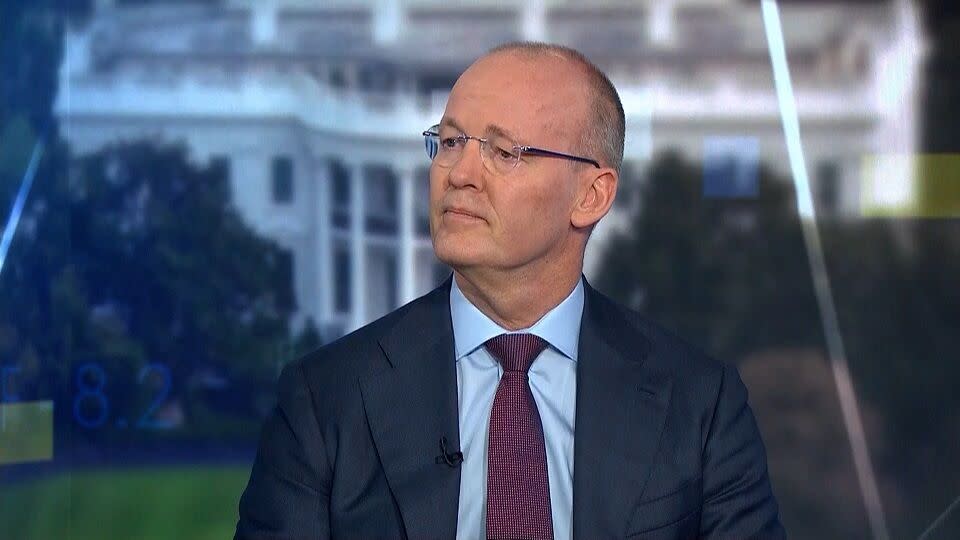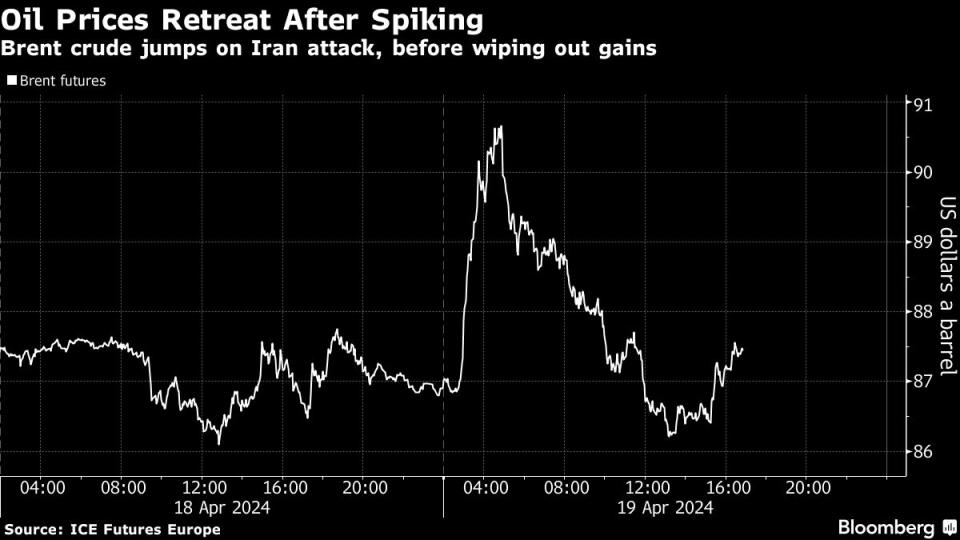Oil Tests Central Banker Nerves With Mideast on ‘Knife Edge’
(Bloomberg) -- Global central bankers fretting about geopolitics just got another sharp reminder overnight about the potential threat that the Middle East poses to their inflation fight.
Most Read from Bloomberg
TikTok to Remove Executive Tasked With Fending Off US Claims
Tesla Spends Weekend Cutting Prices of Cars and FSD Software
The Fed’s Forecasting Method Looks Increasingly Outdated as Bernanke Pitches an Alternative
Trump Has Only $6.8 Million for Legal Fees With Trial Underway
In the same week that multiple monetary officials meeting in Washington said they’re on the lookout for potential oil shocks that could reignite consumer-price growth, Israel’s attack on Iran on Friday caused just the sort of price fluctuations that could test their nerves.
The strikes reported around targets in Isfahan prompted a jump of more than 4% in crude to above $90 a barrel, before erasing that gain to trade lower on the day as Iranian media seemed to downplay the incident. While central bankers won’t have lost sleep at the level it reached, the backdrop isn’t comforting.
At the United Nations Security Council in New York, Secretary-General Antonio Guterres told ambassadors that the Middle East “is on a knife edge,” and Group of Seven foreign ministers are discussing geopolitical threats in Italy on Friday. How that could impact policy will meanwhile focus attendees at the International Monetary Fund meetings in the US capital.
“Typically these events end up being less disruptive than we feared,” Nathan Sheets, chief global economist at Citigroup and a former US Treasury official, told Bloomberg Television. “The problem with geopolitical challenges is, you’ve got to think hard about tail risks, what can happen. Then you move from concerns in oil to broad concerns about the economy.”
That’s the quandary for central bankers who’d entered 2024 with a sense of quiet optimism that the inflation that gripped the world since Russia’s invasion of Ukraine two years ago was looking tamer by the day.
Instead, as Federal Reserve Chair Jerome Powell signaled this week, US officials are now set to wait longer than expected to cut interest rates after a string of inflation and jobs data remained firm.
Global peers are now wondering how far they can diverge from that stance, even if Middle East tensions remain contained to that region. And if oil prices do surge, that could have implications too, particularly for Europe, which depends on dollar-denominated energy imports.
“We could have a severe oil shock, but we’re not there yet,” IMF First Deputy Managing Director Gita Gopinath told Bloomberg TV in Washington. “There are sources of supply that buffer these shocks, but if there is a large-scale escalation in the Middle East, that is a problem.”
One risk posed by a substantial increase in the cost of oil would be that the surge wouldn’t be contained to the gas pump. A cascade effect could hit food and a whole host of other goods, leading workers to renew wage demands that reignite the inflation cycle many policymakers outside the US reckoned they were bringing under control.
Higher crude could also brake economic expansion — a danger that economists at TS Lombard highlighted in a report looking at the implications of oil reaching $100 a barrel.
“Energy price changes have more of an immediate effect on spending than much of the rest of the basket, so growth would be more vulnerable,” they wrote. “This consideration is more pertinent in Europe than in the US, where the consumer remains more resilient. The second-round effects would be greater for the US.”
A direct war between Israel and Iran may cause crude to hit $150 a barrel if it severely hits production and closes the Strait of Hormuz, Bloomberg Intelligence estimated earlier this week. Tensions in that channel — which carries about one-fifth of the world’s crude and has never been fully shut — last flared in 2017, when then-President Donald Trump accused Iran of attacks on two oil tankers.
What Bloomberg Economics Says...
“Global disinflation is moving at different speeds in different parts of the world. If there is an escalation in the Middle East, the impact would be global, but that is more of a risk than a base case...we’ve been having a raging war in the Middle East and trade disruptions in the Red Sea and we haven’t seen a major impact on the world economy — and that’s because the oil has continued to flow.”
—Ziad Daoud, chief emerging markets strategist. For his Global Insight, click here
Iranian state media confirmed the strike by Israel in the early hours of Friday but claimed that the “sabotage” operation involving drones had failed. Nuclear facilities located in Isfahan, Iran’s third-biggest city, are safe, state television and the United Nations’ nuclear watchdog said.
The current standoff may not be over, and it still has the ingredients for things to go awry, according to Tina Fordham, founder of Fordham Global Foresight.
“We should stay on high alert when it comes to the risk of further escalation in the Middle East,” she said in a Bloomberg TV interview. “Israel has shown Iran that it can fire and will fire inside Iranian territory near a military airbase. This is a warning shot, and the ball is now in Iran’s court.”
To be sure, central bankers speaking in Washington before the attack were at pains to appear somewhat sanguine at the Middle East situation, even if they did acknowledge the risks.
The normally hawkish Dutch Governor Klaas Knot, for example, speculated that a surge in the crude price might turn out less pernicious than otherwise because other prices are falling.
“If we have an oil shock, it will be against a backdrop of general disinflation in all other factors,” he said on Thursday. “The likelihood of significant second-round effects, I would argue, is smaller but it is clearly something to monitor.”
--With assistance from Guy Johnson, Anna Edwards, Kriti Gupta, Francine Lacqua, Christopher Condon and Zoe Schneeweiss.
(Updates with growth comment in 12th paragraph)
Most Read from Bloomberg Businessweek
What Really Happens When You Trade In an iPhone at the Apple Store
Rents Are the Fed’s ‘Biggest Stumbling Block’ in Taming US Inflation
Aging Copper Mines Are Turning Into Money Pits Despite Demand
©2024 Bloomberg L.P.






